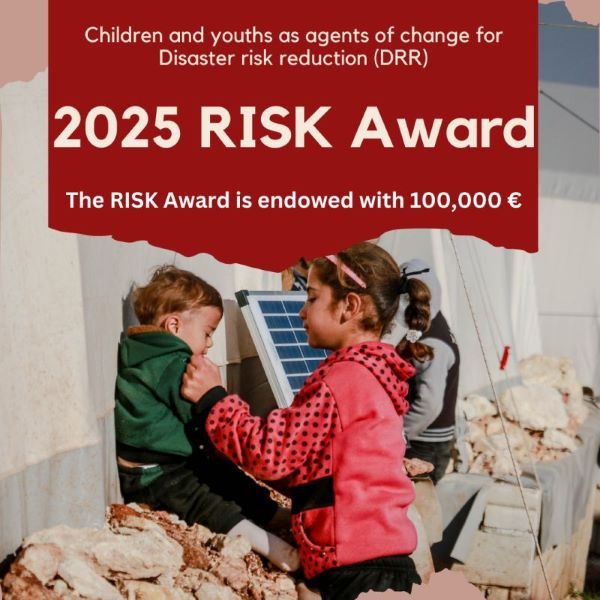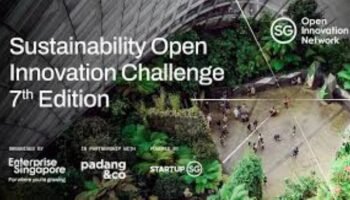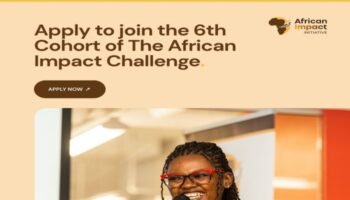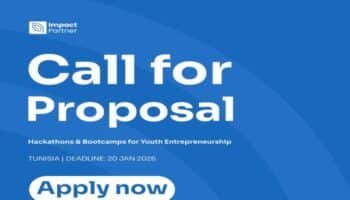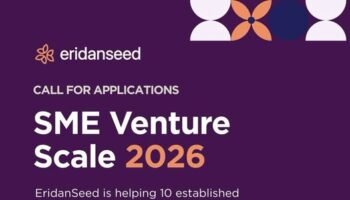The 2025 RISK Award is looking for project proposals under the topic “Children and youths as agents of change for Disaster risk reduction (DRR)”.
Disasters don’t discriminate, yet some people are more at risk! This statement is becoming increasingly true. Analyses of the numbers of victims and people affected prove: countries in the Global South are more affected than countries in the Global North, and vulnerable people, such as marginalised groups, children, young people, women, people with disabilities and more, suffer disproportionally. Data from UNDRR shows that over 1 billion children have had their lives disrupted by disasters since 2000, with more than 80,000 schools damaged or destroyed. According to UNICEF, approximately one billion children worldwide are at extremely high risk due to climate impacts, including climate-related disasters.
To address this injustice, they are dedicating the 2025 RISK Award to the topic of “Children and youths as agents of change for DRR”. It is important to understand that children and young people are not only “victims”, but also have great potential to become risk managers themselves. They can contribute to their own safety, as well as that of their families and communities, in a variety of ways. This can happen through education and raising awareness, participation in DRR planning and decision making, community engagement as well as youth advocacy, amongst other approaches. Everyone is called upon to participate in disaster risk reduction, so if you are involved in disaster risk reduction projects for and with children and young people, this RISK Award is aiming at you. The target region is developing and emerging countries in the Global South.
Funding Information
The RISK Award is endowed with 100,000 €. This means that they can contribute to your project with a maximum of 100,000 €. However, they also understand that there are many initiatives that are larger. In this case, please write in your application what the volume of your overall project is and where the other required financial resources will come from.
RISK Award Timeline
The timeline of the proposed project should be between 12 months and 2 years maximum.
Eligibility Criteria for RISK Award
- It is expected that the successful project will be carried out by a team of people who have complementary skills.
- It is perfectly legitimate to involve participants from partner institutions, but it is not advisable to form too large consortia for the purpose of submitting a proposal.
- Research institutions, non-governmental organisations (NGOs) and non-profit organisations (NPOs) are especially encouraged to submit.
- The RISK Award mainly addresses projects in developing and emerging countries in the Global South. They therefore exclude projects that are positioned in high-income countries according to the World Bank classification.
- The proposed projects must serve a non-profit or charitable purpose. For-profit initiatives are not eligible for selection.
- The RISK Award is given to institutions or organisations. Unfortunately, individuals cannot be considered.
Criteria
- The proposal must address the specific annual RISK Award topic
- The project must be non-profit. Business development is not possible to be supported by the RISK Award.
- The proposed project must include an implementation part (action), a proposal solely based on research is not sufficient.
- The risks must be related to climate change and natural hazards.
- Risks due to social turmoil, war, chemical disasters, and/or political crises are not in the scope of the RISK Award.
- They appreciate ideas to involve the people at risk (people centred approaches).
- They appreciate proposals which combine bottom-up approaches with top-down frameworks (community-based approaches).
- They encourage project teams which are engaged in multi-stakeholder partnerships (different sectors, different sizes, different organisational background, PPPs).
How to Apply
Click here to apply
For more information visit: Munich Re Foundation
Application Deadline: 13 October 2024.
Elevate Your Business With Our Expert Services!


